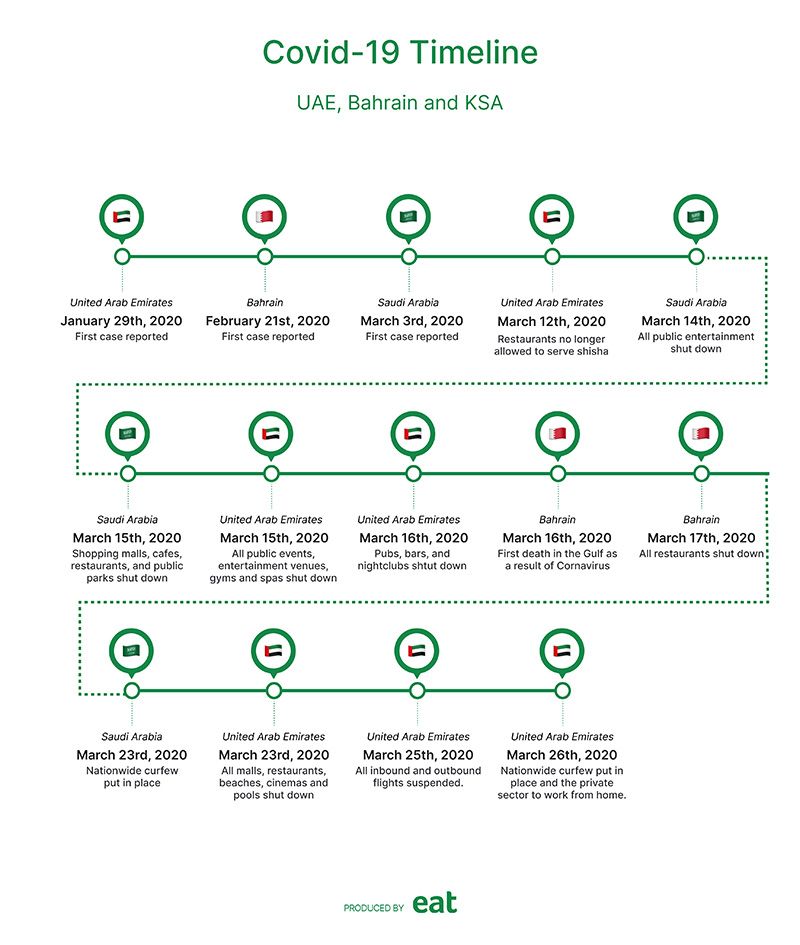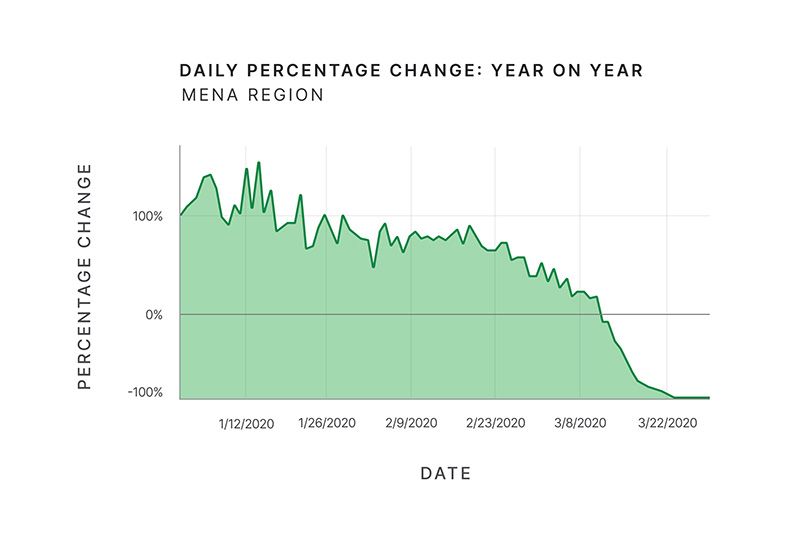The Massive Impact of COVID-19 on the Middle East Restaurant Industry
Restaurants and cafes are one of the most important businesses across the Middle East. Food is an essential part of our culture, and restaurants form the social backbone of cities across the region.
COVID-19 (Coronavirus) is already having a huge impact on the region's restaurant industry and many are already feeling the pain.
Eat App, the Middle East's largest restaurant reservation platform has released new data that shows the huge decline in dine-in visits at restaurants across the region as a result of the Covid-19 crisis. The data tracks aggregated restaurant reservation and walk-in data through the top 1000+ fine dining restaurants in the Middle East.
The figure below charts the timeline of Covid-19 across the countries with the highest volume of fine dining establishments in the region:

Key Highlights
Some of the key takeaways and findings from the data:
- In March 2020, restaurants across the region saw an overall 60% decrease in customers in the weeks leading up to all restaurants shutting down.
- In Dubai, restaurants saw a 30% decrease in business in the days following Dubai banning shisha being served at restaurants.
- In Dubai, restaurants saw an additional 10% drop when all bars, lounges and clubs were ordered to shut down.
- Bahrain, UAE and KSA all saw massive dips in restaurant performance in the days following the first case of the virus in their countries, but business bounced back as usual. The real effects of the virus did not become apparent until decisions were made to protect the public (shutting down restaurants, curfews, etc).
Eat App's data clearly shows the magnitude of the problem the Middle East's fine dining and full service restaurants are now facing in light of the global pandemic.
Daily year on year % change in restaurant visits and reservations across the MENA region

"Restaurants are the lifeblood of cities across the region and play a vital and massive role for tourism in the Middle East. Compared to other industries, businesses in F&B typically have the shortest remaining lifespan once revenue hits $0. And so we stand by all our restaurant partners during this difficult time and will do everything we can to help them make it through to the other side." - Nezar Kadhem, CEO at Eat App
How you can support restaurants through this difficult time
- Use your voice: In response to Covid-19, restaurants are undertaking massive efforts to counteract the negative effects of the virus on their businesses. They have started to make stricter precautionary measures with regards to health, to ensure cleanliness and safety within their outlets. Make sure to spread the word about all the measures to the people around you.
- Order takeout & delivery: As we mentioned earlier, in light of COVID-19, various restaurants have started offering takeout and delivery options to diners so that they can enjoy their favorite meals at home. Show your support to restaurants by ordering meals for home delivery.
- Buy gift cards: Many restaurants across the region are now giving their customers the option of purchasing gift vouchers. These gift vouchers put money back into restaurants now when they need it most while ensuring that they have guaranteed future business when the crisis is resolved. Buy one for you and your friend to make sure that you can still have a delicious meal at your favorite spot once all of this is over.
About the data
This data shows changes in year-over-year reservations for restaurants on the Eat App network across all channels (Walk-Ins, Phone Reservations, and Online Reservations). For the year-over-year comparisons by day, we're comparing the same day of the week and week number to the corresponding day of the week and week number in the previous year. Eg: Friday of week 25 in 2020 is compared to the Friday of week 25 in 2019. All restaurants on the Eat App network in either period are included in the data. The countries we've considered for the daily overall MENA percentage decline are the United Arab Emirates, Saudi Arabia, Bahrain, Egypt, Lebanon, Kuwait, and Oman. For the daily country specific percentage changes we've included countries that have over 200 restaurants.
Find the data here.